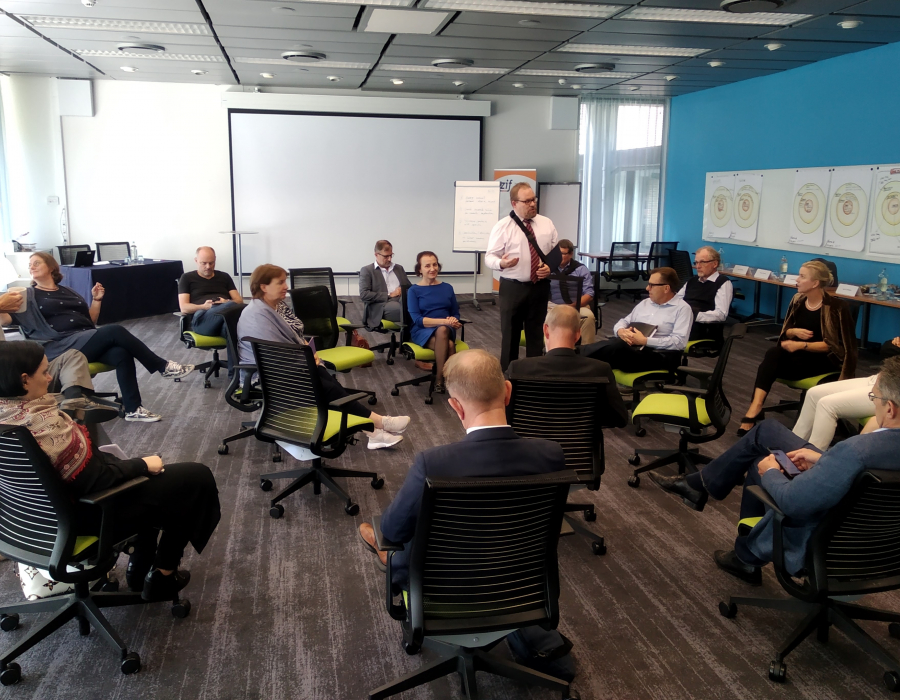Peace Mediation & Mediation Support
We contribute to the areas of peace mediation and mediation support in a variety of ways, from providing professional support to multilateral organisations to developing specific capacities.
Definition of Peace Mediation and Mediation Support
Peace Mediation
The United Nations guidelines for effective mediation describe peace mediation as a voluntary process “whereby a third party assists two or more parties, with their consent, to prevent, manage, or resolve a conflict by helping them develop mutually acceptable agreements.” Peace mediation entails a number of different instruments aimed at resolving inter- and intra-state conflicts, ranging from conflict prevention to support for ceasefire negotiations, to the implementation of peace agreements at various societal levels.
Mediation Support
The term mediation support refers to the support of mediation processes with the aim of improving the conditions for the success of these processes in the long term. Target groups and beneficiaries of mediation support include not only mediating third parties, but also conflict parties, interest groups, donor institutions and other supportive actors.
Mediation support entails:
- Carrying out and providing operational support for peace processes;
- Support to building structures and capacities;
- The preparation and communication of relevant information.
For example, we receive requests ranging from support in the conceptual design of mediation processes to assistance with technical questions relating to security sector reform.
Actors in the area of mediation support can work in various roles, including as mediators, support personnel in advisory, training or research functions, but also as donors or political supporters.
Our Activities in this Area
Our contributions in the area of peace mediation and mediation support focus on strengthening mediation expertise in multilateral organisations and diplomatic initiatives by assisting in the recruitment and secondment of experts and facilitating formats for professional dialogue and trainings.
We are actively involved in peace mediation and mediation support in three concrete areas:
- Transfer of knowledge through peer-to-peer formats;
- Provision of expertise through the ZIF Expert Pool;
- Training.
Transfer of knowledge through peer-to-peer formats
Since 2016, we have been hosting peer-to-peer formats in the form of peer coaching and peer exchanges for senior-level German diplomats as well as senior representatives of multilateral organisations such as the EU, AU or the Arab League. The peer formats are tailored to the respective target group and address a wide range of topics, from building mediation skills to providing assistance in the context of long-term conflicts or the implementation of peace agreements at local level.
In addition to our work with individual international organisations, we also organise peer exchange formats with a focus on inter-institutional exchange. In these formats, participants from different international institutions are provided with a safe space from which to engage in an exchange on different approaches, conflict solution strategies and the conceptualisation of mediation processes.
 ©ZIF
©ZIF
Provision of Expertise from Our ZIF Expert Pool
The ZIF Expert Pool gives us access to qualified civilian experts with specialised skills who can effectively support mediation processes. Some of them are seconded to the respective mediation support departments of international organisations, such as the OSCE, the EU or the UN, as well as to corresponding positions in peace operations in the field.
Training
We offer ZIF training courses on mediation and negotiation techniques as well as conflict analysis to build the capacities of civilian experts to support peace processes. Many missions provide active support for peace processes, peace negotiations or the implementation of peace agreements. Civilian experts should therefore have the necessary skills that allow them to deal constructively with different conflicts and conflict constellations and to participate in their transformation.
Through our capacity-building programs, we contribute to the operational implementation of the EU Mediation Guidelines with regard to the development of national mediation capacities. As such, we cooperate with the Swiss Federal Department of Foreign Affairs (FDFA), the Federal Foreign Office (FFO) and ETH Zurich in the implementation of the annual Peacemediation Course for Diplomats and, together with our partners, contribute to the training of the FFO's higher diplomatic service with a module on peace mediation.
Peace Mediation in German Foreign Policy
The German Federal Foreign Office defines peace mediation as an important foreign policy tool and an integral component of crisis prevention and stabilisation, and endeavours to take on a more active role as mediator or supporter of mediation processes. As a subsidiary organisation of the Federal Foreign Office, we actively support this effort. We work together with national and international partners and use training measures to promote the development and expansion of mediation expertise in the Federal Foreign Office and in international organisations.
In June 2019, the Federal Foreign Office published the Peace Mediation Concept , which defines mediation as an important foreign policy instrument and an integral component of crisis prevention and stabilisation in the Federal Foreign Office.
Further information is available here.
Partnerships
In the transfer of knowledge on mediation-related questions, we cooperate with the mediation support teams of multilateral organisations such as the European External Action Service (EEAS) or the UN Department for Political Affairs and Peacebuilding (DPPA), the AU and the OSCE.
We are also a founding member of the Initiative Mediation Support Germany (IMSD), a network of specialist organisations that supports the Federal Foreign Office in its engagement in the area of peace mediation and mediation support, and that serves as an additional external resource for expertise on mediation.
Publications by the Initiative Mediation Support Deutschland (IMSD): Fact Sheet on Peace Mediation
- Basics of Mediation: Concepts and Definitions
- Roles and Contributions of States in Peace Mediation
- Roles and Contributions of Multilateral and Non-State Actors in Peace Mediation
- Conflict Analysis and Mediation Entry Points
- The Normative Framework and International Legal Basis for Peace Mediation
- Methodology and Communication Tools in Peace Mediation